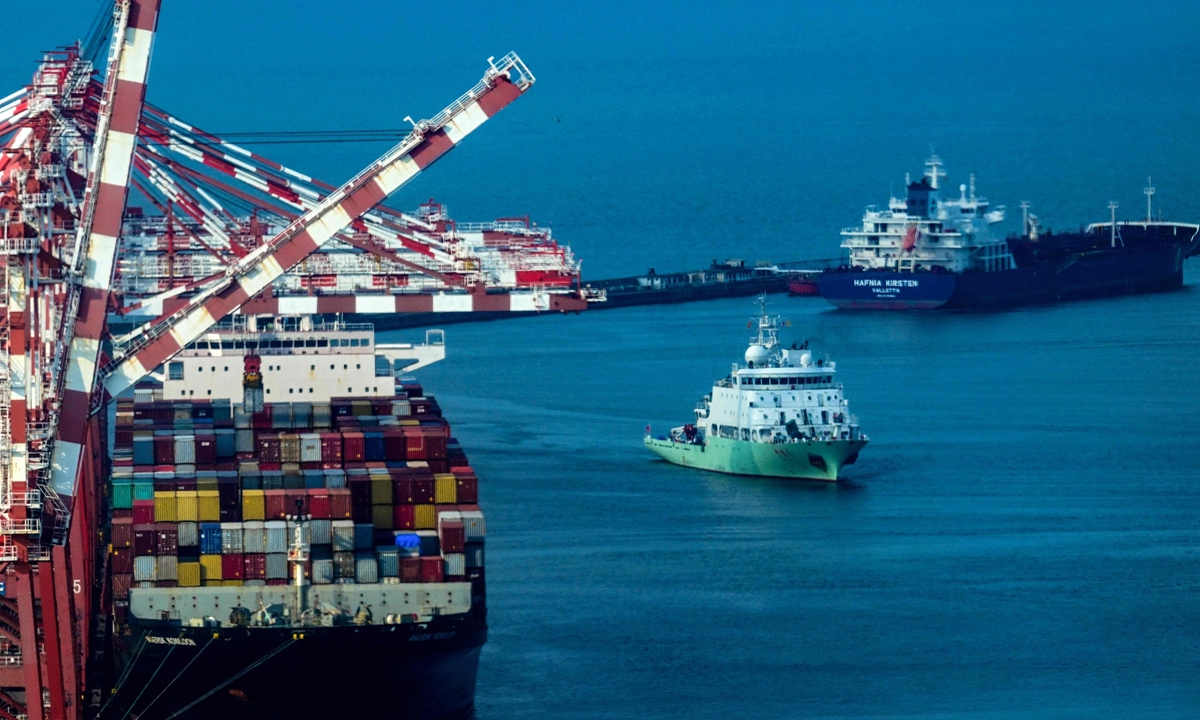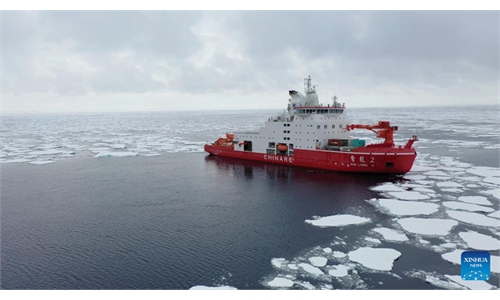China's scientific research ship 'invades' the Indian Ocean? Who will buy it?: Global Times editorial

Chinese research ship Shiyan 6 arrives near a port in Colombo on October 25, 2023. Photo: VCG
The recent report released by the long-established conservative think tank in the US, the Center for Strategic and International Studies (CSIS), states that China's scientific research vessels engaged in energy and marine environmental surveys in the Indian Ocean can support "military needs," including how to maneuver and obscure submarines during conflict. The timing of this report is delicate, coinciding with the visit of Maldivian President Mohamed Muizzu to China, while another South Asian country, Sri Lanka, recently announced the suspension of foreign research vessels including those from China entering its waters under India's pressure. The CSIS report rightly comes at a time when some countries need to manufacture a "China threat" narrative in the Indian Ocean region and provides them with ammunition.
It is essential to shed light on the CSIS in this context. Founded during the Cold War, it has intricate connections with the US military and intelligence agencies. Active-duty military officers can directly serve as researchers in the think tank, and the think tank also regularly undertakes policy reports commissioned by the US Department of Defense. When a think tank with such affiliations releases a report, it becomes challenging for the outside world to acknowledge its authenticity and independence, prompting skepticism about whether it serves as a "white glove" for advancing the strategic and tactical objectives of the US military.
Another noteworthy point is that, following the release of the report by CSIS, Western media quickly followed up on its content. This pattern of "military/intelligence agencies leak information - media follows up with sensationalism - government and parliament apply pressure" has become quite common in recent years in the US and Western countries. The so-called "evidence" against China is often later proven to be baseless or inconclusive, while measures by the US and Western countries to contain and suppress China remain in place.
For instance, take the recent issue raised by the US regarding China's comprehensive scientific expedition in the Indian Ocean. These activities have been ongoing for many years and involve more than just China; countries like Myanmar, Sri Lanka, Thailand, Bangladesh, among others, were once invited by China to participate. Myanmar, Sri Lanka and Bangladesh are all Indian Ocean nations. Does this mean all these countries have intentions to "invade" the Indian Ocean? China has provided detailed public explanations regarding the research topics, scope, and results of each scientific expedition, both before and after the events. What more does China need to clarify? If some countries, right from the beginning, are not interested in the scientific research vessels but have other disguised intentions, then, no matter how China proves its innocence, they will find reasons to overturn it.
The US accuses China's scientific research activities of possibly having military purposes, but what the outside world perceives is the US showcasing its military actions in the Indian Ocean. Just last year, the US and the UK disregarded United Nations resolutions and the sovereignty of Mauritius by privately transferring Diego Garcia Island in the Indian Ocean, which sparked international outrage. Since the US wants to take such a big risk and maintain its military presence in the Indian Ocean, it definitely needs to find a reason. Since even Chinese garlic can be used as a reason to "threaten US national security," what else is deemed impossible?
The Indian Ocean is one of the least understood oceans by the scientific community, and a fundamental reason is the lack of sufficient on-site observations. The unsolved mysteries surrounding the Indian Ocean not only result in scientific losses but also imply uncertainties faced by Indian Ocean countries in terms of climate, ocean currents, resources exploration, and other aspects. In the context of global warming and rising sea levels, this even endangers the national security of coastal countries and the security of all humanity. China and regional countries are exploring the natural ecology of the Indian Ocean through cooperation, without any hidden agenda. The purpose is to further promote marine ecological protection, develop sustainable blue economy, and jointly respond to crisis challenges. In the eyes of some countries, including the US, they only see their own military hegemony and disregard other countries, obstructing and threatening other countries' independent cooperation. It needs to be reminded that most of the Indian Ocean is international waters, not their internal sea.
Interestingly, in response to the vivid portrayal of China's scientific research vessel as a "military threat" by American media outlets such as The Washington Post, there is merciless ridicule from some netizens. One comment sarcastically mocks the US, saying, "Oh my, doesn't China know that only the US can do such things?!" Regardless of how sternly it presents itself now, the US' double standards have already reduced its credibility to zero in the eyes of the international community, resulting in a backlash in public opinion. Hong Kong media has pointed out that while other countries are constrained by the US' selfish interpretation of international law, the US believes it is not bound by the law. Its ideology is, "Do as I say, not as I do."

